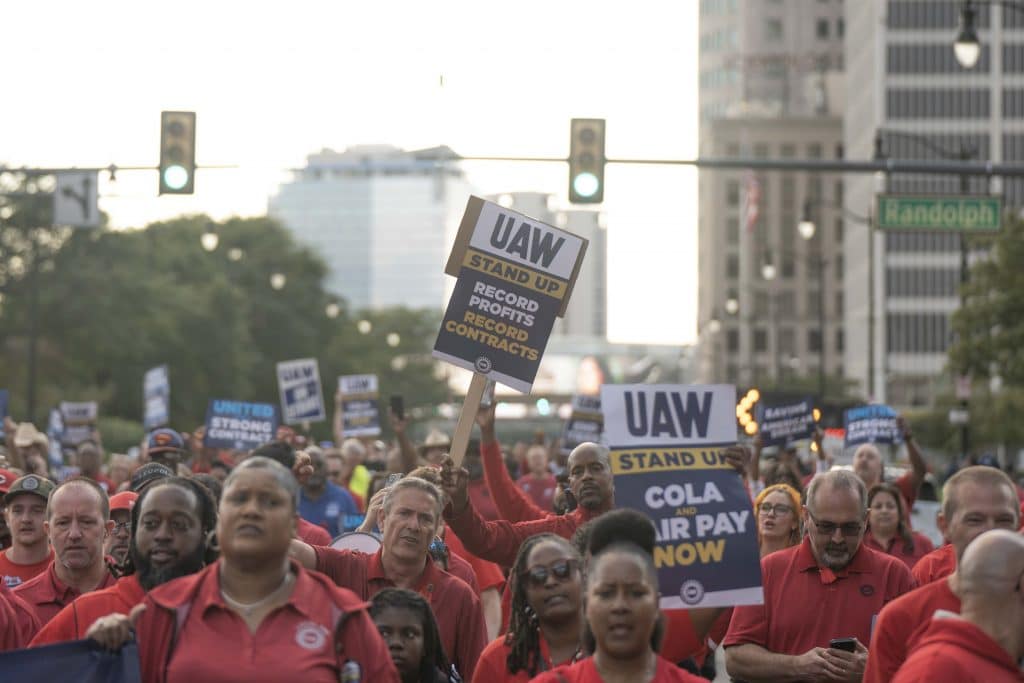The UAW strike is the most important labor action in decades, marking the high point of a hot labor summer in the United States. Not only has the strike captured the attention of the nation, but it has also showcased the growing power and activity of a labor movement confronting bosses whose record-breaking profits have come at the expense of the working class. The working class is at the center of national politics, and its expectations are rising.
Hollywood writers and actors are on their first coordinated strike in six decades; thousands of Los Angeles hospitality workers are on strike; and 340,000 UPS Teamsters prepared to strike last month, showing up at practice picket lines chanting “Ready to strike!” Nationwide, there have been hundreds of other smaller strikes. Indeed, this summer has been quite a hell for bosses. The Wall Street Journal calculates that 4.1 million days of work were lost to strikes in August alone.
These workers’ actions are taking place in a context in which the general population is sympathetic to unions (71 percent of Americans support unions according to a 2022 Gallup poll) and workers’ rights, particularly after the Covid-19 pandemic, during which the very rich got even richer while essential workers kept the economy afloat, often in unsafe conditions. The UAW strike has aroused strong public support of the working class as a whole and the population at large, who are more and more enraged at the insane levels of wealth that the capitalists enjoy. According to a Gallup poll, 75 percent of respondents supported the UAW strike.
The union’s demands are bold and very significant for the labor movement because they go to the heart of the labor conditions in America imposed by decades of neoliberalism. The main demands are the following: eliminate tiers, wage increase of 40 percent, restore the cost-of-living-adjustment (COLA) to ensure wages keep up with inflation, end abuse of temporary workers, and right to strike over plant closures. In interviews and materials put forward by the union, they have been demanding a 32-hour workweek without a reduction in pay.
Surround the Strike with Active Solidarity
Since the strike was called, there has been an outstanding show of solidarity. The Teamsters pledged to not cross picket lines. Hundreds of people, including many youth, have shown up to the picket line and rallies. Even social movement organizations have called on people to join the strike. But the organized labor movement, the AFL-CIO in particular, the social movements, and workers and youth must dig deep to organize the widest and biggest active solidarity nationwide and to put all their strength into this strike. We must organize material support, money for the strike fund, people at the picket lines, and hold support actions and meetings to grow public support and respond to the counteroffensive of management any way we can.
An important step toward developing greater solidarity would be if the recently mobilized Teamsters and other unions fighting tiers, like teachers and university unions, contributed to the UAW strike fund and organized solidarity actions.
We should aim to create open spaces like public assemblies where the movement and the community can come together and coordinate even between the different strike actions that strengthen the offensive against the bosses, as well as raise among the labor movement the various demands concerning the working class, like affordable housing or an end to racist policing.
A victory for the UAW is a victory for the whole working class because it not only opens the door to other combative strike actions based on raised expectations, but also puts the capitalists and their political institutions on the defensive.
Trust the Rank and File, Not the Democrats and Republicans
The strike has already shaken the national situation marked by the presidential campaign and the growing dispute for the working class between the Democratic Party and Trumpism. Trump, who has built his political persona speaking from the side of the industrial working class hit hard by decades of concessions and cutbacks, has criticized both President Biden and UAW president Shawn Fain over the strike, accusing both of siding with companies that want to invest in hybrid cars, threatening the workforce with layoffs. Biden, who hasn’t addressed labor actions recently, spoke on the UAW strike and stated that “workers deserve a fair share of the benefits they helped create for an enterprise.” Behind this statement lies the fear that workers in the Midwest will not vote for him in 2024, which would significantly improve Trump’s chances of going back to the White House. At the same time, Biden seeks the endorsement of UAW and wants to pose as a pro-labor candidate nationally.
The president, who blocked the railroad strike with the help of Congress, cannot afford the same approach against a highly popular strike of a politically important union in the middle of the election campaign. His speech this week was aimed at demanding flexibility from the companies and warning of the danger that the strike could be politically capitalized by Trump.
The UAW is right to demand that all electric vehicle factories be unionized. Workers should also decide what the transition to electric vehicles looks like. Instead of giving billionaires like Elon Musk money to operate hyperexploitative and low-wage factories, that money should be used to ensure that workers’ basic needs are met.
UAW workers cannot trust either Trump or the Democrats who work for their own electoral agendas. This strike can energize the working class as a whole if it continues to rely on organized action and our own strength. To that end, it is essential to unleash the strength, creativity, and power of the rank and file so that the strike builds from the bottom up and not the other way around.
The Strike Must Be Organized from Below
The recent UAW elections saw the workers attempting to take their destiny into their own hands and reject a sellout leadership that has shoved one concession after another down their throats. The workers were tired of the growth of inequality and differences between workers themselves, the deterioration of their rights and benefits, and the increasing disrespect. An important lesson many drew from the 2019 GM strike is that the full power of auto had to be on display to beat back the bosses.
The demand for workers at the Big Three to strike together came from below. That process must continue; rank-and-file UAW members must collectively decide their own fate, including their demands and how they fight. That means that workers, organized from below, must decide which plants join the strike, when those plants join the strike, and how to expand the strike.
Workers should not be kept in the dark about the strategy of their own strike. That was a mistake that caused confusion and disorientation. That is what happened with this current strategy, which wasn’t revealed or discussed with the workers before it was made public. Whatever tactical benefit is gained from keeping the details of the strike strategy secret from the bosses is taken away by the uncertainty it causes among the rank and file. Workers are excited to fight with their union siblings, and they have been eager to take part in this fight. Workers, organized from below, must decide which plants are closed and activated in the strike.
What should this look like? Local strike committees in every plant, where rank-and-file workers — especially those on the shop floor — elect delegates for regional committees to unite and coordinate the strike. Local and regional committees should coordinate the strong support the community has been giving this strike, and reach out to other unions for support. This would be a significant step toward building a national strike committee that would coordinate all efforts to win these significant demands.
For Fain and the Members United Slate, which came into office giving expression to the dissatisfaction of the rank and file, and United All Workers for Democracy (UAWD) as the caucus fighting for expanded union democracy, it is necessary to take another step in putting the workers in control of the union. Strike committees composed of the rank and file must be organized from below and against the resistance of those officers who might oppose direct control of the union by the rank and file.
No to Layoffs and Management Retaliation
The Big Three are taking measures to attack the power of the strike with layoffs and increased discipline at plants not currently on strike.
There have been both layoffs and reports from the shop floor of management being more aggressive and hostile. We should see this as part of the counteroffensive against the strike. There can’t be a business-as-usual response to layoffs. In general they add to the precarity of the conditions faced by the working class when there is no strike, and are an active weapon during the strike. This is a weapon to create doubt among workers, and the only way to shake that doubt is with action decided from below.
Not only have there been 600 workers laid off — and 2,000 more layoffs being threatened — but many supplemental workers are seeing their hours slashed. On top of that, management is handing out daily writeups. One worker reported receiving a writeup for clocking in at 5:59 for a six o’clock shift. Another said 10 workers were walked out by management.
This has created a sense of uneasiness among workers at the factories. The lack of knowledge about the strategy of the strike only compounds this uneasiness. Many are wondering if everyone should have gone out on strike to better protect each other from retaliation.
Now, we know there is no reason for management to lay off workers and slash their hours. This isn’t in their immediate interests, and it only makes running the factories harder. But it is in their interest to break the collective will and power of the workers and to undermine the bold demands that the workers have put forward. They are willing to take the hit now if they think it means getting a more concessionary deal out of the union.
The union must respond to these retaliatory acts with escalating actions and the demand that laid-off workers be immediately reinstated. It should be the workers who decide what that escalatory action is, including the laid-off workers — who must have full rights to participate in any and all decisions about the strike.
Fight for a TA That Makes Workers Whole
The stakes for the strike are high. The demands not only address the conditions facing the working class in general, but speak to the right of workers to high aspirations for themselves and their families. Workers are fighting to ensure that these demands last for generations.
The UAW leadership will come to the bargaining table with the backing of its rank and file, who have shown a great willingness to be made whole. If the rank and file is democratically organized from below, in their own strike committees, it ensures that the leadership can impose more favorable conditions on the bosses at the bargaining table.
Winning a strong contract would be a huge step in creating a combative labor movement, one that fights for the dignity and respect of the working class.











